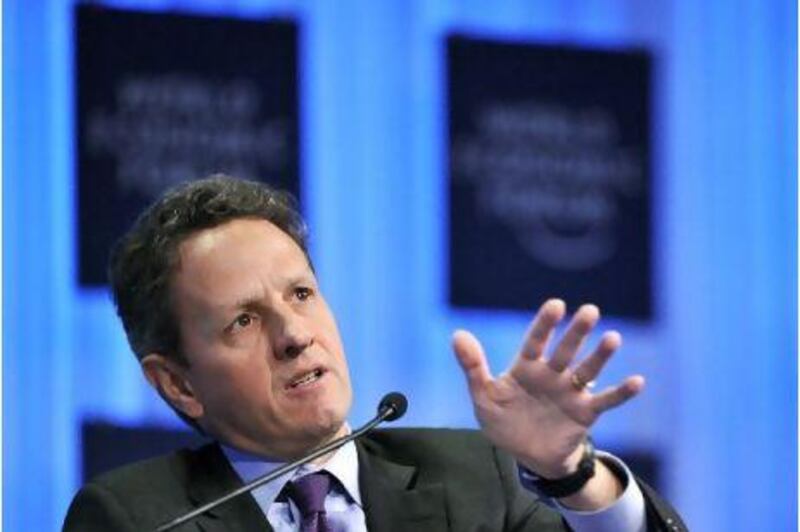Davos // Timothy Geithner, the US Treasury secretary promised to cut the country's estimated US$1.5 trillion (Dh5.5 trillion) budget deficit as doubts surface at the World Economic Forum about the dollar's reserve currency status over the coming decades.
Any shift away from the dollar over the longer term would affect Gulf economies that are linked to the greenback through currency pegs.
But Mr Geithner told an assembled audience of business leaders and politicians at the annual WEF gathering that there was renewed confidence about the US economy.
"America will act and will always act," he said. "It will be easier for us to bring our debt under control to sustainable levels without affecting growth than other countries."
As the most senior US official at this year's event, Mr Geithner's appearance was highly anticipated.
His presence comes against a backdrop of concern among some participants about whether policymakers have a credible plan for trimming the US budget deficit. Unlike some European countries, the US President Barack Obama has not yet detailed how he will handle the challenge.
The UK and others have already embarked on drastic cost-cutting measures aimed at reducing their own debt piles. David Cameron, the British prime minister, earlier defended his actions amid recent indications of stuttering growth in the country's economy.
"My argument is that you can't put it off. We have an 80 per cent debt to GDP ratio," he said in his first speech at Davos as the UK leader.
"Our first priority is to kill off the spectre of massive sovereign debts," he said. "In many ways, we in Europe have been our own worst enemy," he said.
Signs of gathering momentum in the US economy have helped to instil renewed optimism for prospects both in the US and global economies.
"There's a peculiarity about the US, in that we're much more optimistic about the US with its fiscal stimulus," said Stephen King, the chief economist at HSBC. "However, by the way, we are much more pessimistic, too, as the debt to GDP ratio is rising."
Debate at Davos has also focused on to what extent US power and the dollar may diminish in the coming decades.
Discussions over the extent to which the dollar should remain the world's reserve currency were outlined as a priority for the Group of 20 (G20) leading and emerging economies this year by Nicolas Sarkozy, the French president, on Thursday. France is the current holder of the G20 presidency.
As the global power base shifts over the next 10 to 30 years, it is possible that China's yuan could become the new reserve currency, said Mr King.
The dollar has weakened against the euro, despite unrelenting sovereign debt woes in the euro zone.
"For the Gulf, the linkages between the dollar and local currencies are clear and obvious," said John Sfakianakis, the chief economist at Banque Saudi Fransi. "A weaker dollar creates weaker local currencies and it impacts in many ways Gulf economies in terms of imported inflation and purchasing power for governments and consumers alike."
Blame has been levelled at the US for contributing to the escalating costs of commodities.
As the world's economic heavyweight, recent US actions to boost its economy have led to unintended consequences for emerging markets, say economists.
More specifically, quantitative easing measures have led to excessive liquidity flowing to emerging markets, helping to push up inflation.
Rising prices of products including grain and oil have been one cause of recent political unrest in Tunisia, Egypt and Yemen. Anxiety over inflation has also been building in fast-growth countries such as China and India.
But Mr Geithner fought back.
"China should soften its links to the dollar to help fight inflation," he said. "I would not put inflation high on the global level of the list of concerns," he said.






